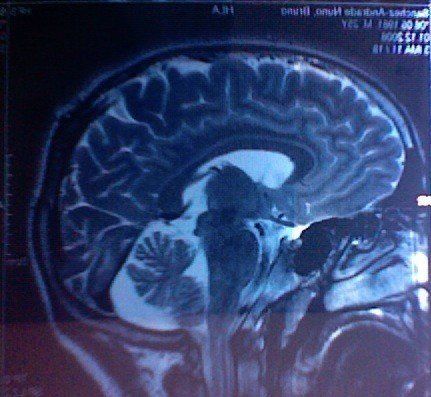
I was having dinner with a friend the other day when our discussion turned to the problem of consciousness. Intrigued by the general host of deep science questions, he didn't see why this famous conundrum was a problem for neurophilosophers (to borrow Patricia Smith Churchland's phrase). The evolving organism functions more effectively if it can represent exterior objects in some kind of mental space. At some point it comes to represent itself in that same space, adding further advantage. The body becomes a representation in what can now be called the self-conscious mind. Why is this a mystery?
Having puzzled on consciousness since college -- I was a Cognitive Science person at the time, working in a clinical psychobiology lab at the NIMH over the summers while writing a thesis on the intersection of physics and psychology, in the grandiose manner of young people -- I found myself taken aback at how difficult it was to say why the emergence of Mind is still a puzzle. Before I could answer, my friend added the shy addendum: "Does it have something to do with quantum mechanics?"
These days, I tend to doubt it. Given a boost by Penrose, but seriously mused on by Planck, Pauli, and other gods of the pantheon, the proposed connection between QM and consciousness seems less compelling than it did in the eighties, when popular science books were conflating cultural expressions (like Zen) with the new particle physics. Here's Gary Zukav from the trend-setting *Dancing Wu Li Masters*:
"Hindu mythology is virtually a large-scale projection into the psychological realm of microscopic scientific discoveries. Hindu deities such as Shiva and Vishnu continually dance the creation and destruction of universes while the Buddhist image of the wheel of life symbolizes the unending process of birth, death, and rebirth which is a part of the world of form, which is emptiness, which is form."

A helpful comparison or a harmful one? We know the fruitless paths this has led many down in the area of popular science, and I personally lament the sense that now exists in the public mind that high energy physics has somehow confirmed various religious and pop psychology viewpoints. (As Asimov smartly rejoined, the only claim the SCM actually shares in common with Genesis is "the universe had a beginning." Given the true/false nature of the assertion, this hardly constitutes an "I told you so" moment.)
At the same time, Zukav managed to impart some of the wonder of modern science, the thrilling recognition that we are very far indeed from the blandness of what was once called "mere determinism." And then Carl Sagan, a lover of human cosmic ambition, very much appreciated the Hindu conception of infinite cosmic cycles - principally for showing that the mind can indeed roam in the utterly astounding reaches of space and time in which the data increasingly locate us. In this vastly expanded world, consciousness does indeed continue to be a puzzle, and we do not yet know exactly how deep its solution may reach. In fact, we don't yet know whether we can even come to a solution; it's conceivable that the fundamental nature of mental acts -- the "purple-ness" of purple, the "I" who feels an intentional state - is one area of nature that is permanently inaccessible to us, exactly because "us" is part of the phenomenon in question.
To return to QM: if I had to guess, I would say, along with Objective Collapse Theories, that "spontaneous localization" will be found to have a much more pedestrian source than Mind . . . such as gravitation. (Yet what is more commonplace than Mind, which has been present at every experiment ever executed?) I would say that the brain's activity will be found to be unrelated to the particle interactions that underlie it in any way more significant than the activities of the liver or heart. I would say that for billions of years the PreCambrian Earth existed in just the way it now does, though unwitnessed.
But that's really just a guess. It's certainly exiting to think, with Wigner, that QM implies a metaphysical primacy to mental actions. What do *you* think? Is consciousness - which I will take here to be the natural activity of brains of a certain complexity -- fundamental or incidental to the structure of the cosmos? Is Mind *itself* foundational?
